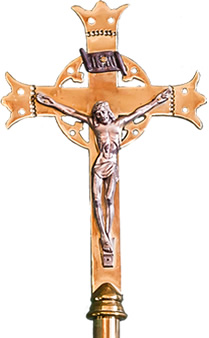The Eucharistic Fast
Whoever is to receive Holy Communion is to abstain for at least one hour before Holy Communion from all food and drink with the sole exception of water and medicine.
The elderly and those who are suffering from some illness, as well as those who care for them, may receive Holy Communion even if within the preceding hour they have consumed something. (Canon 919)
For those who become ill
Please let a priest know as soon as possible. He can then visit you and arrange for you to receive Holy Communion and if you so wish give you the Sacrament of the Sick if there is any danger attached to your illness.
The Sacrament is meant to be given early and is not regarded as “the last rites”. If you have to go into hospital it is much better to receive the Sacrament of the Sick in your own home BEFORE you go- to give you strength comfort and courage to cope with hospital and your illness. You can receive it again in hospital.
In case of death
Please let us know as soon as possible if someone is dying. Often the last person to be called is the priest.
It is the rule that the body of a dead person is not anointed -and this makes it all the more important that the priest know of someone who is dying as early as possible. The last Sacrament is called Viaticum.
Sacrament of Baptism
Parents are obliged to see that their infants are baptised as soon as possible.
When practical after the birth, indeed even before it, they are to approach the parish priest to ask for the sacrament for their child, and to be themselves duly prepared for it. (Canon 867)
First Holy Communion
It is the custom in this diocese that a child makes its first Holy Communion at about the age of 8 years.
Parish classes to prepare children (whether at Catholic or at non-Catholic schools) start each year.
In line with Church practise the children are prepared to receive their First Reconciliation as part of their preparation for First Eucharist. They are also prepared for the Sacrament of Confirmation. (See section below).
It is expected that children attend and parents will attend relevant sessions (and that parents and children attend Sunday Mass regularly). Children of 8 years and over who have not been baptised will be expected to have preparation before Baptism, Confirmation and Holy Communion.
Sacrament of Confirmation
In line with Archdiocesan policy the Sacrament of Confirmation is given to child before they receive First Holy Communion.
It is normally administered by the Bishop in the parish each year. It is expected that those who apply for Confirmation attend Sunday Mass and the classes regularly.
Provision is also made for those older children and adults who would like to receive the Sacrament of Confirmation as required.
Marriages
As soon as a couple become engaged they should inform the Parish Priest.
A minimum of 6 months notice of a marriage is normally required – there are talks to be given and spiritual instruction for both partners, whether Catholic or not. Should the marriage be postponed, it is important to let the priest know as soon as possible.
Lent
Lent is the traditional season of repentance and renewal in the Church.
Canon Law prescribes that Ash Wednesday and Good Friday are to be observed as days of FAST AND ABSTINENCE. FASTING means that the amount of food we eat is considerably reduced. ABSTINENCE means that we give up a particular kind of food or drink or amusement Those over 18 are bound by the law of FASTING until the beginning of the 60th year, while all those over 14 are bound by the law of ABSTINENCE. Parents are urged to foster the spirit and practice of penance among those too young to be subjects of either law.
Easter Dues
Once admitted to Holy Communion, each of the faithful is obliged to receive Holy Communion at least once a year (Canon 920).
The time for this precept to be fulfilled runs from Ash Wednesday until Trinity Sunday (the Sunday after Pentecost). Anyone who is conscious of grave sin may not receive Holy Communion unless they have received the Sacrament of Reconciliation (Confession).
Stole Fees
Traditionally these are personal offerings made to the priest on such occasions as baptisms, marriages, funerals, house blessings and so on.
It is stressed that they are traditional and voluntary and most certainly not obligatory.
Mass Offerings
One of the embarrassing questions put to the priest at times is “How much is the Mass Offering?’
By giving an offering for Mass the donor is not buying the Mass nor paying for it. They are is simply making an offering to the priest towards his maintenance. In fact in the very early times the offering was in ‘kind’. Church law decrees that only one offering may be accepted each day.
Schools
There is a Parish School, St Brendan’s Primary School, at 56 Palmer Crescent. This caters to children from Year 1 to 8.
There is also a primary school, St Michael’s School situated in Taita which also caters for children from Year 1 to 8
Catholic secondary education for young men from Years 9-13 is available in Silverstream at St Patrick’s College.
Catholic secondary education for young men from Years 9-13 is available in Lower Hutt at St Bernard’s College.
Catholic secondary education for young women from Years 9-13 is available in Lower Hutt at Sacred Heart College.

